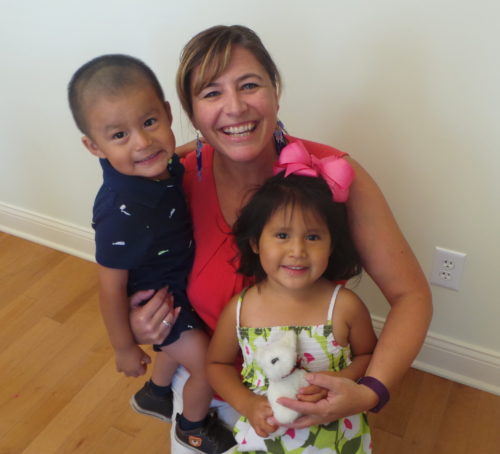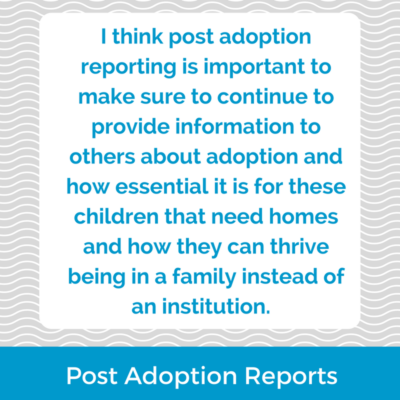 Many countries of origin or sending countries require that adoptive parents send reports after the adoption is finalized, sometimes for many years after the adoption is completed, to ensure the child has transitioned well and to ensure the continued welfare of that child. These reports are referred to as Post Adoption Reports, or in the case where the adoption is not yet finalized, Post Placement Reports. The number and frequency of required reports varies from country to country and adoptive parents should be aware of this requirement and willing to comply. The failure of adoptive parents to submit these reports has been cited as one of the reasons why sending countries have closed adoption programs in the past. Why are these reports considered important to sending countries?
Many countries of origin or sending countries require that adoptive parents send reports after the adoption is finalized, sometimes for many years after the adoption is completed, to ensure the child has transitioned well and to ensure the continued welfare of that child. These reports are referred to as Post Adoption Reports, or in the case where the adoption is not yet finalized, Post Placement Reports. The number and frequency of required reports varies from country to country and adoptive parents should be aware of this requirement and willing to comply. The failure of adoptive parents to submit these reports has been cited as one of the reasons why sending countries have closed adoption programs in the past. Why are these reports considered important to sending countries?
Particularly now during an age when information and news is so readily available, news reports of adoption issues such as “re-homing” and abuse of adopted children become of great concern to countries of origin. Sending countries seeking to place their children in need of families for adoption in the international community want to ensure the child’s safety, progress and wellbeing. Officials hearing news of just one or two cases of abuse or re-homing will create cause for concern for adoption officials in a sending country, making them rethink that perhaps they are placing a child at risk, instead of with a loving and forever family.
Re-homing or the unsupervised transfer of an adopted child to an unauthorized family or home is another cause for concern for a country of origin. When strict guidelines are placed on approvals for adoptive parents to adopt a child, countries of origins become concerned when they believe that once that child arrives in their new country there is a possibility that the child can be moved to a new home that is not properly vetted or screened and approved by authorities, causing risk of harm or abuse to that child.
Post Adoption (or post placement) reports allow for the adoption authority in the country of origin to receive updates on a child that was placed for intercountry adoption, allowing them to see how the child has transitioned to their new family and new culture. It provides a safeguard to ensure there is no abuse, that authorities are supervising the family and wellbeing of the adopted child and that the child has remained in the home that the child was originally approved for and adopted into.
Post adoption reports can include information on the health and development of the child, emotional and mental wellbeing of the child, the child’s home and environment, the child’s progress in school, how the family disciplines the child and how the extended family and friends have accepted the child into the family. It provides peace of mind to that sending country or country of origin, political officials and the adoption authority that placing that child for intercountry adoption was in the best interest of the child. It also provides assurances to allow continued intercountry adoptions for the best interests of future children in need of families from that country.
Countries of origin want to ensure that the children from their country continue to be provided with the care that was promised to them, post adoption reporting is one tool that helps ensure this care is being provided. Post Adoption Reports provide peace of mind to the adoption officials in countries of origin that their decision to place their children for intercountry adoption is the right decision.

